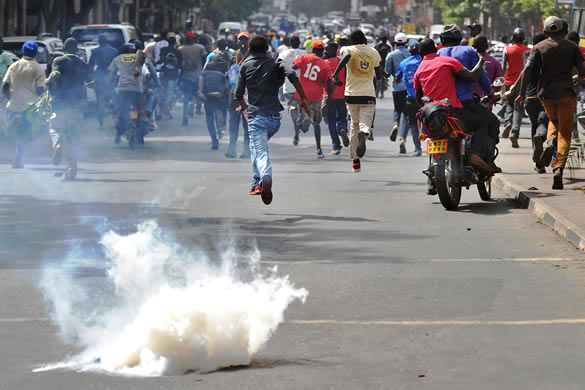Headline
Kenya Police Chief Resigns After Protests

Kenya’s police chief has resigned following sharp criticism after anti-government protests left dozens of people dead, the presidency said Friday, the latest head to roll over the unrest.
The move came a day after President William Ruto sacked almost his entire cabinet, seeking to contain widespread public anger against his government after largely peaceful demonstrations over proposed tax hikes descended into deadly mayhem.
The presidency said in a statement that Ruto has “accepted the resignation” of inspector general of police Japhet Koome, who has served in the role since November 2022.
Some of the young Gen-Z Kenyans behind the demonstrations had called for Koome to go, with police accused of using excessive force during the protests, the most serious crisis of Ruto’s near two-year presidency.
READ ALSO: At Least 30 Killed In Kenya Anti-government Protests – HRW
Ruto has taken a series of measures to placate the demonstrators, including abandoning the finance bill that contained the deeply unpopular tax increases.
On Thursday, he dismissed the attorney-general and all cabinet ministers, with the exception of Foreign Minister Musalia Mudavadi and Deputy President Rigathi Gachagua.
-‘Wasted two years’ –
But the cabinet announcement, while welcomed by some, did not appease some young Kenyans frustrated with Ruto’s failure to deliver on his 2022 election promises to create jobs and boost their fortunes.
“We will be back on the streets until Ruto goes. He has wasted two years in office travelling and telling lies,” said Hyrence Mwangi, 25.
READ ALSO: [JUST IN] Alleged N33.8b Fraud: Court Grants Bail To Ex-power Minister
Initially peaceful, the protests sharply escalated when police fired at crowds who stormed parliament on June 25, ransacking the partly ablaze complex.
While large-scale street protests have subsided, anger against the government has not, particularly towards the police, with rights groups saying that 39 people were killed in the demonstrations.
“When we first went to the streets, Ruto dismissed us as a bunch of hired goons and criminals, only to come later and start saying he will make changes,” said 27-year-old Jackson Rotich.
“We can’t trust him.”
IT specialist Cyrus Otieno, 27, was among those who had called for Koome to go, saying he “must be prosecuted for police brutality”.
Law student Melisa Agufana, 24, welcomed the cabinet dismissal, saying she wanted to “thank the president for listening”.
She added that ministers had “wasted two years doing nothing apart from being driven around with our national flag.”
READ ALSO: Ruto Ready For ‘Conversation’ With Youth Protesters, Says Kenya’s Presidency
-Fresh start after protests –
Analysts said the move offered the possibility of a fresh start, but warned of further risks.
“The challenge that Ruto now faces is forming a new cabinet that includes various vested interests, whilst simultaneously calming popular anger in the face of an explicitly leaderless movement,” Gabrielle Lynch, professor of comparative politics at the University of Warwick, told AFP.
Last week, Ruto announced sharp cuts to government spending, including travel and refurbishment costs, and said he would increase borrowing to pay for some services even as Kenya grapples with massive foreign debt equivalent to roughly 70 percent of GDP.
The crisis led US-based Moody’s to downgrade Kenya’s debt rating further into junk territory, warning of a negative outlook, which will make borrowing even more expensive for the cash-strapped government.
Ruto said Thursday that he would “immediately engage in extensive consultations across different sectors and political formations, with the aim of setting up a broad-based government”, without elaborating further.
Headline
South Korea, Japan Protest China, Russia Aircraft Incursions

South Korea and Japan reacted furiously on Wednesday after Chinese and Russian military aircraft conducted joint patrols around the two countries, with both Seoul and Tokyo scrambling jets.
South Korea said it had protested with representatives of China and Russia, while Japan said it had conveyed its “serious concerns” over national security.
According to Tokyo, two Russian Tu-95 nuclear-capable bombers on Tuesday flew from the Sea of Japan to rendezvous with two Chinese H-6 bombers in the East China Sea, then conducted a joint flight around the country.
The incident comes as Japan is locked in a dispute with China over comments Prime Minister Sanae Takaichi made about Taiwan.
READ ALSO:China Backs Nigeria, Warns Against Foreign Interference
The bombers’ joint flights were “clearly intended as a show of force against our nation, Defence Minister Shinjiro Koizumi wrote on X Wednesday.
Top government spokesman Minoru Kihara said that Tokyo had “conveyed to both China and Russia our serious concerns over our national security through diplomatic channels”.
Seoul said Tuesday the Russian and Chinese warplanes entered its air defence zone and that a complaint had been lodged with the defence attaches of both countries in the South Korean capital.
“Our military will continue to respond actively to the activities of neighbouring countries’ aircraft within the KADIZ in compliance with international law,” said Lee Kwang-suk, director general of the International Policy Bureau at Seoul’s defence ministry, referring to the Korea Air Defence Identification Zone.
READ ALSO:Trial For South Korean Woman Accused Of ‘Suitcase Murders’ Starts Today
South Korea also said it deployed “fighter jets to take tactical measures in preparation for any contingencies” in response to the Chinese and Russian incursion into the KADIZ.
The planes were spotted before they entered the air defence identification zone, defined as a broader area in which countries police aircraft for security reasons but which does not constitute their airspace.
Japan’s defence ministry also scrambled fighter jets to intercept the warplanes.
Beijing later Tuesday confirmed it had organised drills with Russia’s military according to “annual cooperation plans”.
READ ALSO:South Korean Actress Kim Sae-ron Found Dead In Seoul Apartment
Moscow also described it as a routine exercise, saying it lasted eight hours and that some foreign fighter jets followed the Russian and Chinese aircraft.
Since 2019, China and Russia have regularly flown military aircraft into South Korea’s air defence zone without prior notice, citing joint exercises.
In November last year, Seoul scrambled jets as five Chinese and six Russian military planes flew through its air defence zone.
Similar incidents occurred in June and December 2023, and in May and November 2022.
READ ALSO:Russia Insists Ukraine Must Cede Land Or Face Continued Military Push
Meanwhile, Tokyo said Monday it had scrambled jets in response to repeated takeoff and landing exercises involving fighter jets and military helicopters from China’s Liaoning aircraft carrier as it cruised in international waters near Japan.
It also summoned Beijing’s ambassador after military aircraft from the Liaoning locked radar onto Japanese jets, the latest incident in the row ignited by Takaichi’s comments backing Taiwan.
Takaichi suggested last month that Japan would intervene militarily in any Chinese attack on the self-ruled island, which Beijing claims as its own and has not ruled out seizing by force.
AFP
Headline
Thousands Reported To Have Fled DR Congo Fighting As M23 Closes On Key City

Fierce fighting rocked the eastern Democratic Republic of Congo on Tuesday as the Rwanda-backed M23 militia rapidly advanced towards the strategic city of Uvira, with tens of thousands of people fleeing over the nearby border into Burundi, sources said.
The armed group and its Rwandan allies were just a few kilometres (miles) north of Uvira, security and military sources told AFP.
The renewed violence undermined a peace agreement brokered by US President Donald Trump that Kinshasa and Kigali signed less than a week ago, on December 4.
Trump had boasted that the Rwanda-DRC conflict was one of eight he has ended since returning to power in America in January.
READ ALSO:Ambassadorial Nominees: Ndume Asks Tinubu To Withdraw List
With the new fighting, more than 30,000 people have fled the area around Uvira for Burundi in the space of a week, a UN source and a Burundian administrative source told AFP.
The Burundian source told AFP on condition of anonymity he had recorded more than 8,000 daily arrivals over the past two days, and 30,000 arrivals in one week. A source in the UN refugee agency confirmed the figure.
The Rwanda-backed M23 offensive comes nearly a year after the group seized control of Goma and Bukavu, the two largest cities in eastern DRC, a strategic region rich in natural resources and plagued by conflict for 30 years.
Local people described a state of growing panic as bombardments struck the hills above Uvira, a city of several hundred thousand residents.
“Three bombs have just exploded in the hills. It’s every man for himself,” said one resident reached by telephone.
READ ALSO:South Africa Beat DR Congo In shootout To Finish Third At AFCON
“We are all under the beds in Uvira — that’s the reality,” another resident said, while a representative of civil society who would not give their name described fighting on the city’s outskirts.
Fighting was also reported in Runingo, another small locality some 20 kilometres (12 miles) from Uvira, as the M23 and the Rwandan army closed in.
Burundi views the prospect of Uvira falling to Rwanda-backed forces as an existential threat, given that it sits across Lake Tanganyika from Burundi’s economic capital Bujumbura.
The city is the main sizeable locality in the area yet to fall to the M23 and its capture would essentially cut off the zone from DRC control.
READ ALSO:Stampede Kills 37 During Army Recruitment In Congo Capital
Burundi deployed about 10,000 soldiers to eastern DRC in October 2023 as part of a military cooperation agreement, and security sources say reinforcements have since taken that presence to around 18,000 men.
The M23 and Rwandan forces launched their Uvira offensive on December 1.
Rich in natural resources, eastern DRC has been choked by successive conflicts for around three decades.
Violence in the region intensified early this year when M23 fighters seized the key eastern city of Goma in January, followed by Bukavu, capital of South Kivu province, a few weeks later.
– Regional risk –
The peace deal meant to quell the fighting was signed last Thursday in Washington by Congolese President Felix Tshisekedi and his Rwandan counterpart Paul Kagame, with Trump — who called it a “miracle” deal — also putting his signature to it.
READ ALSO:FULL LIST: US To Review Green Cards From 19 ‘Countries Of Concern’ After Washington Shooting
The agreement includes an economic component intended to secure US supplies of critical minerals present in the region, as America seeks to challenge China’s dominance in the sector.
But even on the day of the signing, intense fighting took place in South Kivu, where Uvira is located, which included the bombing of houses and schools.
Witnesses and military sources in Uvira said that Congolese soldiers fleeing the fighting had arrived in the city overnight Monday and shops were looted at dawn.
Several hundred Congolese and Burundian soldiers had already fled to Burundi on Monday, according to military sources, since the M23 fighters embarked on their latest offensive from Kamanyola, some 70 kilometres north of Uvira.
Since the M23’s lightning offensive early this year, the front had largely stabilised over the past nine months.
Burundian President Evariste Ndayishimiye warned in February there was a danger of the conflict escalating into a broader regional war, a fear echoed by the United Nations.
Headline
‘Santa Claus’ Arrested For Possessing, Distributing Child Sexual Abuse Material

A 64-year-old man from Hamilton Township has been arrested in the United States after investigators linked him to the possession and distribution of child sexual abuse material.
The suspect, identified as Mark Paulino, had been working as a “Santa for hire” at holiday events, a role that placed him in repeated contact with children.
Mercer County officials said the investigation began on 4 December when detectives were alerted to suspicious online activity involving the uploading of child pornography from a residence in Hamilton Township. The probe quickly identified Paulino, a retired elementary school teacher, as the person involved.
READ ALSO:Nigerian Ringleader Of Nationwide Bank Fraud, Money Laundering Jailed In US, Says FBI
Police stated that Paulino had presented himself online as a retired teacher and had recently performed as Santa Claus for photographs and private, corporate, and organisational events. “Because this role involved direct, repeated contact with children, detectives worked around the clock to secure a search warrant,” authorities explained.
The warrant was executed on 5 December, during which police seized multiple items regarded as evidentiary. Paulino was taken into custody without incident and charged with possession and distribution of child sexual abuse materials, as well as endangering the welfare of a child.
Prosecutors have filed a motion to detain him pending trial. The investigation remains ongoing, and authorities have urged members of the public with relevant information to come forward.

 Headline4 days ago
Headline4 days agoJUST IN: Soldiers Announce Military Takeover Of Govt In Benin Republic

 News4 days ago
News4 days agoRufai Oseni Breaks Silence On Alleged Suspension From Arise TV

 News4 days ago
News4 days agoOAU Unveils Seven-foot Bronze Statue Of Chief Obafemi Awolowo

 Politics3 days ago
Politics3 days agoJUST IN: Tinubu Holds Closed-door Meeting With Rivers, Ebonyi Govs

 Metro5 days ago
Metro5 days agoJUST IN: Military Jet Crashes In Niger Community

 News3 days ago
News3 days agoWhy My Lineage Qualifies Me For Awujale Throne — K1 De-Ultimate

 Politics3 days ago
Politics3 days agoTinubu, Six APC Governors Hold Closed-door Meeting At Aso Villa

 Entertainment5 days ago
Entertainment5 days agoShola Allyson Finally Reveals Why She Refuses To Reference Jesus In Her Songs [VIDEO]

 News4 days ago
News4 days agoWoman Taken For Dead Wakes Up Inside Coffin Few Minutes To Her Cremation

 Politics4 days ago
Politics4 days agoAmbassadorial Nominees: Ndume Asks Tinubu To Withdraw List


























